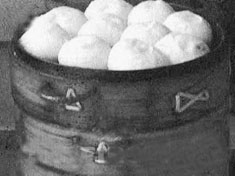| Home / China / Local News | Tools: Save | Print | E-mail | Most Read |
| Beijing Cardboard Buns Confirmed as Bogus |
| Adjust font size: |
Baozi, or Chinese steamed buns, are traditionally filled with minced pork. They are a common snack across China. Last month Beijing Television hired a hidden camera to "reveal" the making of the cardboard baozi allegedly sold in Beijing's Chaoyang District.
The footage showed a man and his assistants mixing together 60 percent cardboard with 40 percent fatty meat to make baozi fillings. This supposedly fooled average buyers, who were said to be unable to taste the difference. This shocking report was quickly scooped up by various Chinese and international media. Even China Central Television aired the program nationwide last Thursday.
But the television station announced yesterday that the story was completely fabricated. They also apologized to the general public.
After the program was aired, the statement said, the Beijing Administration for Industry and Commerce and Municipal Food Safety Department immediately sent investigators to thoroughly inspect and examine the city's breakfast market. They never found any proof to support the shocking story and the existence of the cardboard baozi. Later Beijing municipal police joined in the investigation and discerned the truth on July 16.
Beijing police confirmed that in mid-June, a temporary employee of Beijing Television, surnamed Zi, twice visited a residence in Chaoyang District. Zi told people there that he was buying breakfast for his migrant workers. Then he delivered minced pork, flour and cardboard that had been soaked in caustic soda to the residence. Zi asked four male non-Beijing residents to make baozi for him. He recorded the whole process with a DV camera, and later edited the clip. Zi’s footage was intended to create a sensational hoax because he wanted to gain higher ratings. When the television station agreed to air the story, they didn't realize that his footage was fraudulent.
Police said they have taken the suspect into criminal custody. He will receive the severest legal punishment.
Beijing Television also apologized for failing to check the authenticity of the report that has caused huge public outrage and a negative social influence. The executives admitted that they had learned a serious lesson from this incident. Beijing Television executives affirmed that they would punish all involved staff while simultaneously strengthening the administration. The station will improve staff members’ professional ethics in order to avoid future false stories.
But China's food safety is still a heated topic in the international community these days. The US Food and Drug Administration was criticized Tuesday by the US Congress regarding several recent cases linked to "contaminated Chinese pet foods and seafood imports.” Additionally, the Philippine's Bureau of Food and Drugs is thoroughly examining over 800 registered food products, including the very famous Chinese White Rabbit candy. It has been alleged that some of the candy “contained formaldehyde".
A Shanghai candy manufacturer has issued a statement yesterday to strongly denounce the Philippine's claims. The US Department of Health and Human Services has set up a delegation to come to Beijing in August in order to discuss relevant issues with Chinese food safety regulators.
"Illegal exports are an important factor behind the increasing food scare incidents related to China recently," Li Yuanping, an official at the General Administration of Quality Supervision, Inspection and Quarantine, said to Xinhua News Agency yesterday. Li stressed that China has imposed extremely strict supervision regarding exported goods. He noted that more than 99 percent of Chinese exports have passed inspection.
(China.org.cn by Zhang Rui July 19, 2007) |
| Tools: Save | Print | E-mail | Most Read |
 |
| Related Stories |
|
